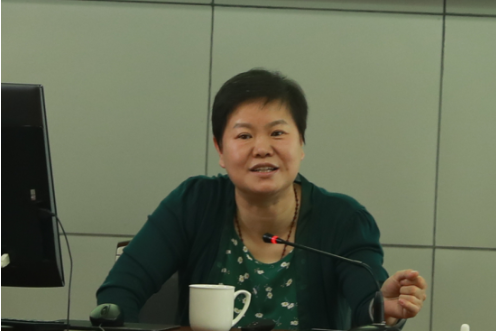On June 11, the President of China Institute for Marine Affairs (CIMA) Prof. Zhang Haiwen was invited to visit Wuhan University China Institute of Boundary and Ocean Studies (CIBOS) to give a lecture on "Research on Legal Issues in Arctic Governance". Prof. Yu Minyou, Dean of CIBOS, hosted this seminar. Yang Li, Deputy Director of the Institute for Marine Law and Policy of National Institute for South China Sea Studies (NHSCS); Gao ShengTi, Director of the Center for International Judicial and Arbitration of Hainan University along with teachers and students of CIBOS & IIS participated in the event.

President Zhang started with analyzing the concept of “governance” from the perspectives of subject, object, basis, path and goal. Participants in polar governance include sovereign states, contracting parties, international or regional organizations, non-governmental organizations and stakeholders. The objects of governance are mainly the influence and change of human activities, rather than the natural phenomenon itself. The basics for governance are not only international law and international rules, but also international community consensus and domestic law. The main mean of governance is political diplomacy; in addition, it includes international and domestic legislation, policies and institutional mechanisms for related matters. Multilateral, bilateral and unilateral measures are worth considering. However, there are still relatively few concerns about duration, standards, and effects of governance. As a new territory affecting the world's sustainable development and human survival, polar issue has become increasingly important in China's security strategy and diplomatic strategy. It has a strong comprehensive nature, including multiple levels and involving multiple fields.

( Prof. Zhang Haiwen)
President Zhang believes that the following issues about Arctic governance are important: first is the different juridical status in the Antarctic and the Arctic. The Antarctic region is mainly land-based, which means that all nations' original territorial claims will be freeze as well as proposing new territorial sovereignty or other claims is not allowed. These places are subjected to the Antarctic treaty system including the Antarctic Treaty and other new agreements. The Arctic is mainly made up of oceans, including land, sea, ice sheet and seabed and subsoil. It applies to relevant nations' domestic law, the United Nations Convention on the Law of the Sea, the Svalbard Treaty and other international treaties and other new rules.
Second is the fact that the Arctic region has different geographical ranges based on different criteria. Geographically, the north latitude 66°33’ of the Arctic Circle is the boundary of the Arctic region, with a total area of 21 million square kilometers. In phenology, the average 10°C isotherm (the ocean 5°C isotherm) in July is used as the southern boundary of the Arctic region, with a total area of 27 million square kilometers. Based on the distribution of plant species, all the taiga are classified into the Arctic, with a total area of over 4,000 square kilometers.
Third is the overall situation of the governance of the Arctic. The Arctic issue has caused widespread concern in the international community. Internal conflicts coexist with common exclusion, fierce competition and cooperation. The interests of the Arctic Rim countries are fierce, and there is a potential for a sudden change in the situation in part of these waters. The rapid development of the Arctic has a major impact on global change. The competition for the Arctic Ocean by the Arctic rim countries directly affects the Arctic interests of other countries in many ways.
The fourth issue is the law application in the Arctic. The laws applicable to the Arctic are diverse, including international law, regional agreements, bilateral treaties, codes/rules, declarations and domestic laws coexist, and soft and hard laws are applied. In terms of names, there are conventions, treaties, agreements, codes/rules, declarations and domestic laws. From the perspective of effectiveness, there are hard law with coercive force and soft law with no coercive force. From the perspective of the application of the law, the subject, scope of application, and prescribed rights and obligations of these legal documents vary. The current application is based on the UNCLOS and legal documents under the framework of the International Maritime Organization (IMO). The laws and rules applicable to the Arctic include the comprehensive norms of the UNCLOS, as well as navigation, resources, environmental protection, sea cargo and passenger transportation, liability and compensation, and scientific research, and the Arctic countries. The application of UNCLOS is also different.
The fifth is the issue of the outer continental shelf of the Arctic. The standards for the outer continental shelf are not yet determined. Russia, Norway, the Faroe Islands, Iceland and other countries have proposed the continental shelf of 200 nautical miles away.
Additionally, President Zhang also stressed that the Arctic's governance institutions are diverse, playing a role in different fields such as economic science and technology, environmental protection, climate change, Arctic shipping, and sea area demarcation. There are regional institutions and global institutions. Among them the Arctic Council is the most important intergovernmental cooperation mechanism. In terms of fisheries negotiations, the countries concerned have now reached an international agreement on high seas fishing in the Arctic Ocean, the Agreement on Preventing the Central and Northern Oceans from Controlling High Seas Fisheries, and actively promoting preventive measures to manage the high seas fisheries in the Arctic Ocean. There are the International Arctic Forum, the Arctic Circle Conference and the China-Nordic Arctic Cooperation Seminar.
In the discussion session, President Zhang Haiwen together with teachers and students from CIBOS discussed the following topics: since the United States is not a party to the UNCLOS, can it submit claims of the continental shelf of 200 nautical miles to the United Nations Commission on the Limits of the Continental Shelf; China’s position on the Arctic; and Fisheries agreement in the Arctic Ocean.
(Rewritten by Xiong Shiyao)
(Edited by Fu Shanshan)
